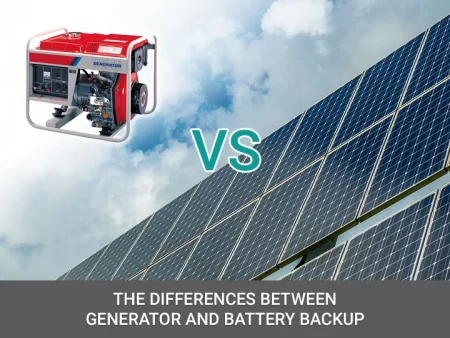 Power backup is essential if you live in areas where power outage is typical or weather conditions are extreme. We may choose from different backup power systems based on multiple factors. Diesel generators and other standard fuel-powered generators have been used in the past. However, as they release toxic carbon monoxide gases, people have always searched for greener alternatives. Battery backups are one such environment-friendly and much better alternative to conventional generators.
Power backup is essential if you live in areas where power outage is typical or weather conditions are extreme. We may choose from different backup power systems based on multiple factors. Diesel generators and other standard fuel-powered generators have been used in the past. However, as they release toxic carbon monoxide gases, people have always searched for greener alternatives. Battery backups are one such environment-friendly and much better alternative to conventional generators.
Although both generators and battery backups do the same thing, they differ in functionality from each other. Each has its advantages and disadvantages, that has been covered in our article below.
Battery Backups
Home battery backup systems like Tesla Powerwall store energy used to power your house during power outages. They run on electricity and source energy from either an electrical grid or a solar system. Thus, they do not negatively impact the environment and are also cheaper than diesel generators.
Additionally, people opting for the time-of-use plan can save energy costs by using backup systems. It gives you the option to use battery backup to provide electricity during off-peak hours.
Generators
Speaking of generators, these are connected to your house’s electrical panel and start automatically when there is a power outage—running on fuel to power your home during the outage, which could be either natural gas, diesel, or liquid propane. There are duel-fueled generators that use both liquid propane and natural gas.
The market also offers generators that can be connected to a propane tank or your home’s gas line. You do not need to refill these manually like diesel generators.
Comparison Between Battery Backup and Generators
Price
The upfront cost of owning a battery backup is expensive compared to diesel generators. But as generators use fuel to generate electricity, your running costs are much higher than battery backups.
Installation
You can mount battery backups on a wall or in a corner of your house, but installing a generator requires more work. But in both cases, you have to hire a professional, and it usually takes an entire day. Besides setting your device, you have to pour a concrete slab for installing a generator.
Maintenance
Maintaining a generator is tougher than battery backups. The latter runs quietly and independently without producing any emissions. Generators are often noisy and disrupts while they are in use. Additionally, they emit exhaust fumes and depending on the type of fuel you use, it may irritate your neighbors.
Powering Your Home
Generators are a clear winner when it comes to powering your house for long hours. If you have enough fuel, you may keep them running for weeks. However, it’s not possible with battery backups. For instance, Tesla Powerwall comes with a storage capacity of 13.5 kilowatt-hours. It can only power your house for a few hours on its own. If you are using a solar panel system, you may give it extra power.
So, Which One Is Perfect For My House?
Battery backup is the winner in most categories and is best for the environment. Additionally, it’s easy to install and cheaper to maintain in the long run. Lastly, they usually have a longer warranty compared to standby generators.
On the flip side, a single generator is required to restore power in a power outage. Hence, your upfront costs are lower. Also, standby generators last much longer than a battery backup in a single session. They are a better option if you need power backup for more extended hours each day.
If you want to install a diesel generator in your house or business in Florida, contact Mid Florida Diesel. They have been servicing residents and businesses of Florida since 1996. They specialize in sales diesel generators and switchgear, repair and maintenance of diesel generators.
Picture Credit: Pixabay



